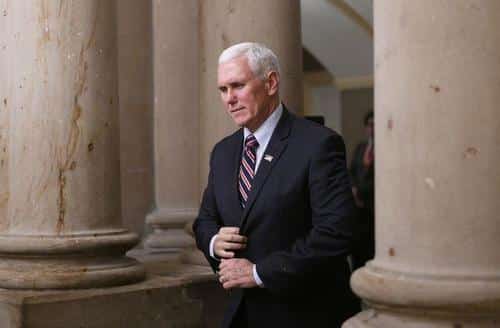The last step in a US presidential election is when congress meets in a joint session on January 6 to count the Electoral College votes which have been certified and sealed by each state, and officially declare a winner.
Of note, moments before proceedings began, Pence said he has ‘no authority to unilaterally determine votes,’ and will leave it up to elected officials to make the decision.
Watch Live:
Pence’s full comments:
BREAKING: Pence will not try to block Biden electors pic.twitter.com/ybV67KP9rm
— Anthony DeRosa 🗽 (@Anthony) January 6, 2021
Text:
Dear Colleague:
Today, for the 59th time in our Nation’s history, Congress will convene in Joint Session to count the electoral votes for President of the United States. Under our Constitution, it will be my duty as Vice President and as President of the Senate to serve as the presiding officer.
After an election with significant allegations of voting irregularities and numerous instances of officials setting aside state election law, I share the concerns of millions of Americans about the integrity of this election. The American people choose the American President, and have every integrity of this election. The American people choose the American President, and have every right under the law to demand free and fair elections and a full investigation of electoral misconduct. As presiding officer, I will do my duty to ensure that these concerns receive a fair and open hearing in the Congress of the United States. Objections will be heard, evidence will be presented, and the elected representatives of the American people will make their decision.
Our Founders created the Electoral College in 1787, and it first convened in 1789. With the advent of political parties, the Electoral College was amended in 1804 to provide that Electors vote separately for President and Vice President. Following a contentious election in 1876, with widespread allegations of fraud and malfeasance, Congress spent a decade establishing rules and procedures to govern the counting of electoral votes and the resolution of any objections.
During the 130 years since the Electoral Count Act was passed, Congress has, without exception, used these formal procedures to count the electoral votes every four years.
Given the controversy surrounding this year’s election, some approach this year’s quadrennial tradition with great expectation, and others with dismissive disdain. Some believe that as Vice President, I should be able to accept or reject electoral votes unilaterally. Others believe that electoral votes should never be challenged in a Joint Session of Congress.
After a careful study of our Constitution, our laws, and our history, I believe neither view is correct.
The President is the chief executive officer of the Federal Government under our Constitution, possessing immense power to impact the lives of the American people. The Presidency belongs to the American people, and to them alone. When disputes concerning a presidential election arise, under Federal law, it is the people’s representatives who review the evidence and resolve disputes through a democratic process.
Our Founders were deeply skeptical of concentrations of power and created a Republic based on separation of powers and checks and balances under the Constitution of the United States.
While my role as presiding officer is largely ceremonial, the role of the Congress is much different, and the Electoral Count Act of 1887 establishes a clear procedure to address election controversies when they arise during the count of the vote of the Electoral College. Given the voting irregularities that took place in our November elections and the disregard of state election statutes by some officials, I welcome the efforts of Senate and House members who have stepped statutes by some officials, I welcome the efforts of Senate and House members who have stepped forward to use their authority under the law to raise objections and present evidence.
As presiding officer, I will ensure that any objections that are sponsored by both a Representative and a Senator are given proper consideration, and that all facts supporting those objections are and a Senator are given proper consideration, and that all facts supporting those objections are brought before the Congress and the American people. Those who suggest that raising objections under the Electoral Count Act is improper or undemocratic ignore more than 130 years of history, and fail to acknowledge that Democrats raised objections in Congress each of the last three times that a Republican candidate for President prevailed.
Today it will be my duty to preside when the Congress convenes in Joint Session to count the votes of the Electoral College, and I will do so to the best of my ability. I ask only that Representatives and Senators who will assemble before me approach this moment with the same sense of duty and an open mind, setting politics and personal interests aside, and do our part to faithfully discharge our duties under the Constitution. I also pray that we will do so with humility and faith, remembering the words of John Quincy Adams, who said, “Duty is ours; results are God’s.”
Four years ago, surrounded by my family, I took an oath to support and defend the Constitution, which ended with the words, “So help me God.” Today I want to assure the American people that I will keep the oath I made to them and I will keep the oath I made to Almighty God. When the Joint Session of Congress convenes today, I will do my duty to see to it that we open the certificates of the Electors of the several states, we hear objections raised by Senators and Representatives, and we count the votes of the Electoral College for President and Vice President in a manner consistent with our Constitution, laws, and history. So Help Me God.
* * *
While most elections have included objectors from the losing party, this time will be a little different – as over 90 GOP lawmakers (77 Representatives and 13 Senators) have pledged to object to the election – even if it doesn’t change the outcome.
“I’m hoping that the American people get to hear just a small amount of evidence,” said Rep. Marjorie Taylor Greene (R-GA) in a Tuesday statement to the Epoch Times.
Here’s how the process for handling objections will work: Of both a House member and a Senator lodge their objection in writing, the joint session will go to recess, while the House and Senate meet separately to debate for up to two hours. Members will be allowed to speak for five minutes each, after which both chambers will vote. For an objection to succeed it needs to achieve a simple majority in both chambers.
House Speaker Nancy Pelosi, D-Calif., will preside over any House debate and has tapped Democratic Reps. Adam Schiff, Calif., Zoe Lofgren, Calif., Jamie Raskin, Md., and Joe Neguse, Colo., to lead any responses to GOP objections. But other Democrats from states Republicans are focused on are expected to also speak out against the effort as well. –NPR
Meanwhile, theories have been flying over what Vice President Mike Pence may or may not ‘do’ to overturn the results of the November election based on widespread allegations of fraud, and several last-minute procedural changes which Republicans say opened the door for manipulation.
On Tuesday – following a report in the New York Times that Pence allegedly told Trump he has no power to change the election results, President Trump issued a sharp rebuke – calling the report “fake news.”
“The New York Times report regarding comments Vice President Pence supposedly made to me today is fake news. He never said that. The Vice President and I are in total agreement that the Vice President has the power to act,” Trump said in a statement, before listing several options he says Pence has under the constitution: “He can decertify the results or send them back to the states for change and certification. He can also decertify the illegal and corrupt results and send them to the House of Representatives for one vote for one state tabulation.”
— Jack Posobiec 🇺🇸 (@JackPosobiec) January 5, 2021
NPR pours cold water on the ‘Patriot Pence’ theory, however, after ‘an administration official who was not authorized to speak on the record’ said that “The VP intends to follow the law and uphold the Constitution tomorrow,” adding that Pence – a lawyer by training – has prepared for the joint session by meeting with the Senate parliamentarian, and has been reading legal opinions and studying the Constitution.
Here is the full list of planned objectors via the Epoch Times:
Senate
Sen. Josh Hawley (R-Mo.)
Sen. Ted Cruz (R-Texas)
Sen. Marsha Blackburn (R-Tenn.)
Sen. Steve Daines (R-Mont.)
Sen. James Lankford (R-Okla.)
Sen. John Kennedy (R-La.)
Sen. Mike Braun (R-Ind.)
Sen. Ron Johnson (R-Wis.)
Sen. Bill Hagerty (R-Tenn.)
Sen. Cynthia Lummis (R-Wyo.)
Sen. Roger Marshall (R-Kan.)
Sen. Tommy Tuberville (R-Ala.)
Sen. Kelly Loeffler (R-Ga.)
House of Representatives
Rep. Mo Brooks (R-Ala.)
Rep. Matt Gaetz (R-Fla.)
Rep. Marjorie Taylor Greene (R-Ga.)
Rep. Madison Cawthorn (R-N.C.)
Rep. Barry Moore (R-Ala.)
Rep. Bob Good (R-Va.)
Rep. Jody Hice (R-Ga.)
Rep. Brian Babin (R-Texas)
Rep. Ted Budd (R-N.C.)
Rep. Lauren Boebert (R-Colo.)
Rep. Lance Gooden (R-Texas)
Rep. Jeff Van Drew (R-N.J.)
Rep. Louie Gohmert (R-Texas)
Rep. Ronny Jackson (R-Texas)
Rep. Jeff Duncan (R-S.C.)
Rep. Burgess Owens (R-Utah)
Rep. Andrew Clyde (R-Ga.)
Rep. Jerry Carl (R-Ala.)
Rep. Yvette Herrell (R-N.M.)
Rep. Mark Green (R-Tenn.)
Rep. Ralph Norman (R-S.C.)
Rep. Paul Gosar (R-Ariz.)
Rep. Diana Harshbarger (R-Tenn.)
Rep. Clay Higgins (R-La.)
Rep. Jason Smith (R-Mo.)
Rep. Billy Long (R-Mo.)
Rep. Sam Graves (R-Mo.)
Rep. Vicky Hartzler (R-Mo.)
Rep. Scott Perry (R-Pa.)
Rep. Guy Reschenthaler (R-Pa.)
Rep. Dan Meuser (R-Pa.)
Rep. Glenn Thompson (R-Pa.)
Rep. Mike Kelly (R-Pa.)
Rep. Lloyd Smucker (R-Pa.)
Rep. John Joyce (R-Pa.)
Rep. Fred Keller (R-Pa.)
Rep. Joe Wilson (R-S.C.)
Rep. Byron Donalds (R-Fla.)
Rep. Randy Weber (R-Texas)
Rep. Barry Loudermilk (R-Ga)
Rep. John Rutherford (R-Fla.)
Rep. William Timmons (R-S.C.)
Rep. Kevin Hern (R-Okla.)
Rep. Kat Cammack (R-Fla.)
Rep. Chuck Fleischmann (R-Tenn.)
Rep. Jim Jordan (R-Ohio)
Rep. Richard Hudson (R-N.C.)
Rep. Ron Estes (R-Kan.)
Rep. Tracey Mann (R-Kan.)
Rep. Jacob LaTurner (R-Kan.)
Rep. Elise Stefanik (R-N.Y.)
Rep. Doug Lamborn (R-Colo.)
Rep. Mike Rogers (R-Ala.)
Rep. Chris Stewart (R-Utah)
Rep. Russ Fulcher (R-Idaho)
Rep. Andy Biggs (R-Ariz.)
Rep. Jackie Walorski (R-Ind.)
Rep. Jack Bergman (R-Mich.)
Rep. Tim Walberg (R-Mich.)
Rep. Ron Wright (R-Texas)
Rep. Warren Davidson (R-Ohio)
Rep. John Carter (R-Texas)
Rep. Robert Aderholt (R-Ala.)
Rep. Mike Garcia (R-Calif.)
Rep. Bill Posey (R-Fla.)
Rep. Scott Franklin (R-Fla.)
Rep. Jim Banks (R-Ind.)
Rep. Steven Palazzo (R-Miss.)
Rep. Adrian Smith (R-Neb.)
Rep. David Rouzer (R-N.C.)
Rep. Bob Gibbs (R-Ohio)
Rep. Markwayne Mullin (R-Okla.)
Rep. Scott DesJarlais (R-Tenn.)
Rep. Pete Sessions (R-Texas)
Rep. Dan Bishop (R-N.C.)
Rep. Jodey Arrington (R-Texas)
Rep. Rick Crawford (R-Ark.)



